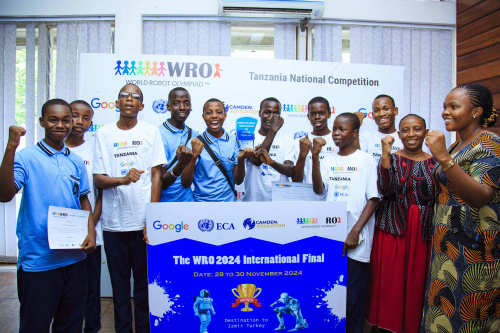Robotics Bootcamp attracts hundreds of young talents to UDSM, sparks passion for Physics and Technology
By Jackson Isdory, CMU
In empowering the next generation of innovators and problem-solvers and supporting initiatives to nurture talent and align the workforce with national and global technological demands, the University of Dar es Salaam recently convened 289 young minds in a transformative experience, the Robotics Bootcamp.
The ten-day camp, organised by Ms. Eva Shana, Assistant Lecturer in the Department of Physics, brought together young students, aged between 8 and 19, from Dar es Salaam schools of Jangwani, Feza, Azania, Shaaban Robert, Alpha Girls, and Alpha to embark on a journey into robotics and the Science, Technology, Engineering, and Mathematics (STEM) programme.
Ms. Shana said the bootcamp, funded by Google, the United Nations Economic Commission for Africa (UNECA), and The Camden Trust, aimed to instill hands-on skills in robotics technology while igniting a passion for science and technology among Tanzania’s young future innovators.
“Our goal was to provide students with practical skills and hands-on experience on robotics to inspire them to think critically about solving problems facing their communities through robotic-based solutions”, said Ms. Shana.
Ms. Shana further said that the programme had a bigger mission of not just about learning robotics but also filling in the gap of qualified physics teachers in Tanzania and promoting careers in STEM.
Ms. Shana coordinated a team of dedicated facilitators, including fellow Assistant Lecturers Mr. Sawa Hezekiah and Gilya Sungi and Laboratory Scientist, Mr. Hashim Rajabu. “Together, we created a dynamic learning environment where participants engaged in activities such as building robotic models, programming, and tackling real-world problems through collaborative efforts’, said Shana.
The camp was in line with not only the STEM programme (which, at UDSM, is implemented under the Higher Education for Economic Transformation-HEET Project) but also the Samia Scholarship – both initiatives are set to empower the next generation of innovators and problem-solvers.
Efforts to bridge the gap: dealing with the growing concern on the shortage of Physics teachers
According to Science teachers, Tanzania has struggled with a shortage of qualified physics teachers in secondary schools for years. The challenge is associated with the number of teachers as well as the quality and ability to inspire students.
“Physics, known for its complexity and perceived difficulty, has often seen low enrollment rates, leading to a shortage of experts in the field. The situation significantly affects the country's ability to meet the increasing demand for skilled science, engineering, and technology professionals”, said Dr. Mwingereza, a senior faculty member at UDSM.
Dr. Mwingereza Kumwenda, who provided expert’s insights in this regard during the bootcamp said that addressing the shortage of physics teachers is crucial for Tanzania’s economic and technological development. “Without a strong foundation in physics, we cannot expect to produce the engineers, doctors, or scientists needed to drive our nation forward”.
He reiterated that UDSM is at the forefront of efforts to address the gap in physics education. “Through innovative programmes like the Robotics Bootcamp, the university is working to stimulate interest in science subjects from a young age”.
He stressed that the bootcamp's approach to combining robotics with problem-solving activities provides a gateway for students to see the practical applications of physics, thereby making the subject more accessible and engaging.
Meanwhile, Ms. Mshana pointed out that teaching physics should go beyond traditional classroom methods and that it is important to integrate technology, such as robotics, to show students the real-world applications of physics concepts. “It demystifies the subject and allows students to develop a genuine interest in it”.
Inspiring future Physics professionals
The Principal of the College of Natural and Applied Science (CoNAS), Prof. Flora Magige, said the University, through Physics Department is enhancing its curriculum to prepare better teaching candidates with modern skills and knowledge in physics pedagogy.
“UDSM is nurturing a new generation of educators equipped to teach physics innovatively by combining solid theoretical foundations with practical training and exposure to cutting-edge technology”, said Prof. Magige.
She said that to sustain interest in physics and STEM, the University is expanding outreach programmes that target primary and secondary school students and teachers nationwide; and forming partnerships with international organisations like Google and UNECA to secure funding and resources for more STEM initiatives, ensuring the continuous development of the next generation of scientists and educators.
“UDSM's efforts include underserved rural areas, where the need for physics teachers is even more pronounced. UDSM hopes to create a positive effect that reaches every corner of the country by training physics educators who can inspire and mentor students in remote areas”, she said.
Fostering a culture of innovation and problem-solving
The Robotics Bootcamp was a prime example of UDSM's strategy to make learning physics engaging. Students built robotic models, learned programming skills, and participated in sessions where they used robotics to solve real-world problems.
Students were encouraged to think critically about societal challenges and develop robotics-based solutions, resulting in projects such as Trash and Waste Robots, Beach Waste Control Robots, and CO2 Emission Control Robots. Through this hands-on approach, students learned physics concepts and applied them meaningfully. This experiential learning reinforces classroom lessons and stimulates an interest in STEM fields.
It also held a pitching competition, during which students showcased 12 robotics-based solutions addressing issues such as environmental sustainability and public safety. The top teams earned the opportunity to represent Tanzania at the World Robot Olympiad (WRO) in Izmir, Turkey, later this year.
Additionally, the student teams were invited by the ICT Commission to present their projects at the 8th Annual Conference in ICT. This recognition highlighted the students' achievements and emphasized the role of STEM education in fostering innovative solutions to societal challenges.


